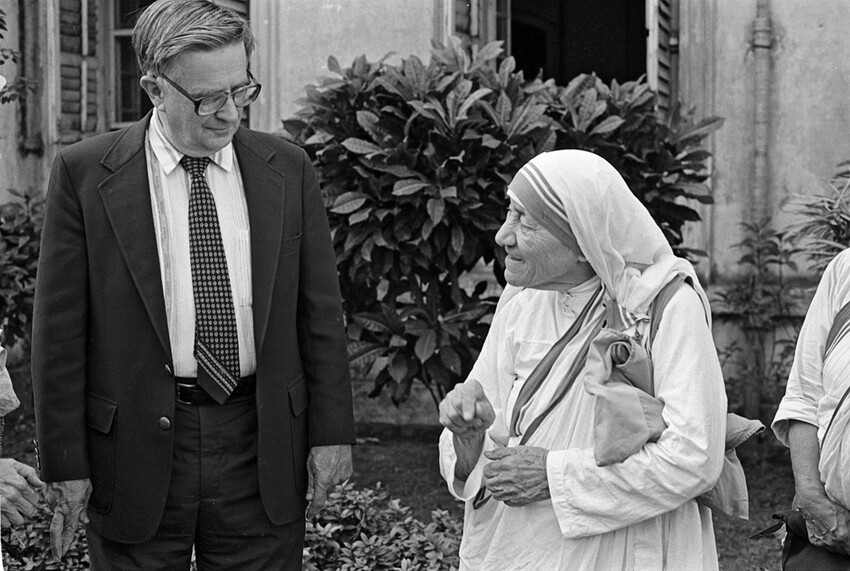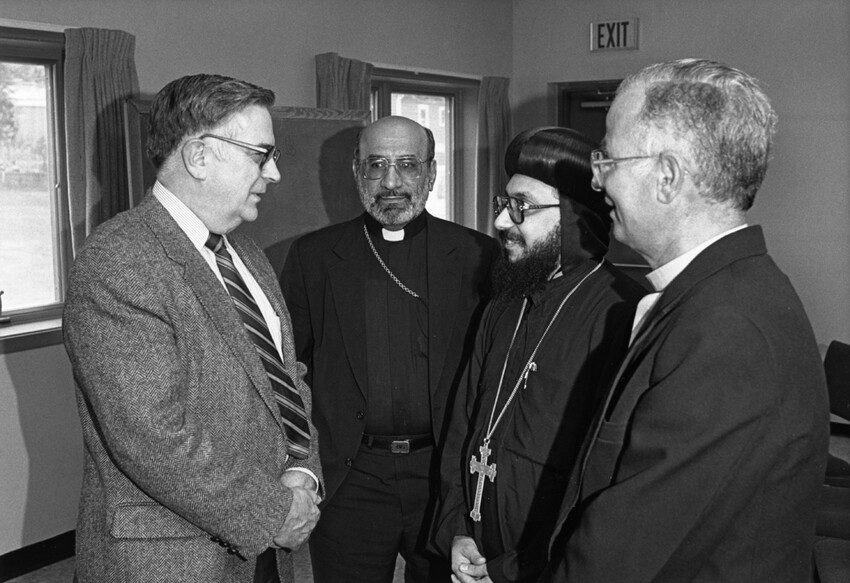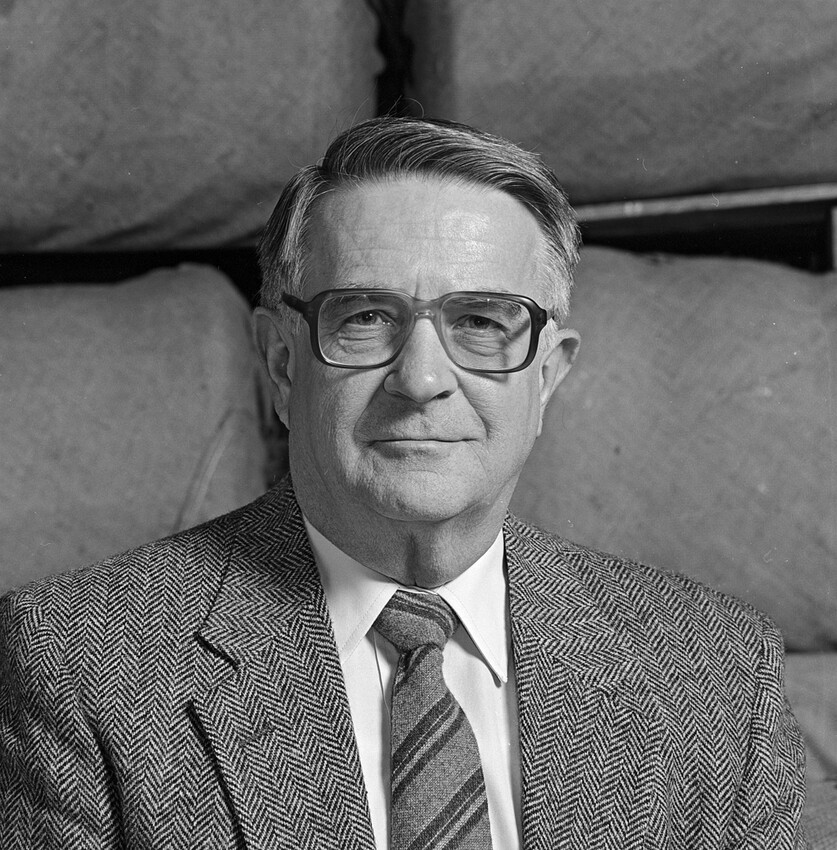Remembering John A. Lapp
A legacy of service to MCC and the church
John A. Lapp, an accomplished historian, seasoned administrator and leader who shaped the work of Mennonite Central Committee (MCC) as executive secretary from 1985 to 1996, died Dec. 5 in Goshen, Indiana. He was 90 years old.
Steeped in history, with a lifelong habit of reading extensively, Lapp had a gift for looking – and encouraging others to look – deeply at MCC’s work and connections to churches, both local and global, said Ron Mathies, MCC executive director from 1996 to 2005 and a board chair before that.

“He always saw the big picture, which not everybody did, then he made the big picture available for people,” Mathies said. “He was deeply, deeply committed to the church. He was always asking, ‘What impact does this have on the church? What can we learn from the church?’”
That dedication to the church and to his Mennonite faith – paired with an intense interest in religious and cultural movements and how the work of the church intersected with the work of the world – was a deep seam running through his life.
“John took all of his gifts and talents – and they were many – and he humbly put them at the service of the church for his whole life,” said Nancy Heisey, MCC’s associate executive secretary from 1989 to 1992 and later president of Mennonite World Conference.
And the impact of that service reached literally across the globe. “John’s reputation and impact on the world, through MCC, are widely known, and as widely and deeply appreciated,” said Rick Cober Bauman, executive director of MCC Canada. “I have profound gratitude for his contributions to relief, development and peace in the name of Christ.”

Lapp graduated from Eastern Mennonite College (now Eastern Mennonite University, EMU) in Harrisonburg, Virginia, in 1954 while the draft for the Korean War was still in place. He and his wife Mary Alice, newly married, moved to Cleveland where he was a hospital orderly for his 1-W alternate service assignment and worked on a master’s degree in history.
He returned to teach at EMU – and got his own look at history-making events in 1963 when he and some others from EMU traveled to hear Martin Luther King Jr. speak on the National Mall during the landmark “March on Washington for Jobs and Freedom.” He earned his PhD from the University of Pennsylvania in 1965, writing his dissertation on the Mennonite Church in India.
Lapp spent three years, 1969 to 1972, leading MCC’s Peace Section, then was selected to serve as academic dean, and later provost, at Goshen College in Goshen, Indiana.

He returned to MCC as executive secretary in 1985.
As he began the role, “I did not bring to Akron a ready-made platform or program,” a 1994 MCC news article noted. “I wanted to build on the strong vision already there and for new programs to be developed as we discerned the times and as God’s spirit led us – field people, Akron staff and the executive committee.”
And, in a way, that pattern of deep reflection, of discernment, of an openness to change, was his legacy to MCC and a great gift, notes Ann Graber Hershberger, executive director of MCC U.S.
Coming from an academic tradition, he thought deeply about the hows and whys of MCC’s work, and urged others to do the same, moving the organization forward, often by means of what he would ask.
“He’d turn his face to you, a twinkling in his eye, with a provocative question that helped you get clearer,” she recalled.
That didn’t mean he was directing a conversation toward a foregone conclusion, Mathies stressed. He was good at leaving room for others to widen the questions or discussion. He was open to being challenged. But, Mathies noted, “You did that carefully knowing his understanding of history and voluminous reading.”
Gracious, welcoming and humble, Lapp “always had time for everybody,” Mathies remembered. During each orientation, Lapp and his wife Alice would invite the new MCC workers to their home, a tradition Mathies and his wife Gudrun would continue.

Lapp would sign each letter to supporters. In 1996, as Mathies began the role, now with the title of executive director, one of the gifts Lapp gave him was a pen. “During my 11 years as executive secretary, I signed 190,000 thank-you letters to contributors,” Lapp said at the time. “This pen will be the first of many Ron will need to sign thank-you letters.”
He traveled extensively, beginning his time as executive secretary with a six-week Africa trip that included stops in Nairobi, southern Africa and a Somali refugee camp. In 1994 he pointed to visits with partners and workers as a highlight of his service. “It is truly inspiring to see these people – in Atlanta, Mindanao, Damascus as examples – serve others, to see them incarnate Christ's love.”
In 1996, as he prepared to end his term, he wrote of the unfinished business he saw in MCC – from responding to growing human needs in the face of conflict, displacement and hunger to working for peace, learning from the church and witnessing to God’s ever-present grace.
“MCC is inspired by the good news that ‘love is Lord of heaven and earth.’ … Whatever we do is a statement that whatever moves the world is not religious or political power or technological know-how but love, which created, sustained and saves the world,” he wrote.
After finishing as executive secretary in 1996, Lapp and his wife Alice served with MCC in India until retiring in 1997.
During Lapp’s time as executive secretary, MCC as part of the celebration of its 75th anniversary made a “jubilee gift” of $600,000 to Mennonite World Conference (MWC).

His connections to MWC continued after retirement, when he worked on an MWC project known as the Global Mennonite History Series. He fundraised and supervised an international team that ultimately produced five separate published volumes on Africa, Europe, Latin America, Asia and North America.
As this work was winding down, John and Alice returned to Goshen, Indiana.
John is survived by children: John F. (Sandra Shenk) Lapp, Jennifer Lapp Lerch (Robert A.), Jessica Lapp (Philip Hertzler); grandchildren: Sophie Lapp Jost (David Jost), Sarah Lerch (Stefan Kuhns), Robert T. Lerch, Eva Lapp (Sam Smucker), John Ethan Lapp, James Nicholas Hertzler; and two great-grandchildren: Timothy Clement Lapp Jost and Morgan Amelia Lerch Kuhns. Also surviving are siblings Mary Swartley, James, Daniel, Joseph, Sara Kolb, Ruth Lapp Guengerich and Rhoda Lapp. In addition to his parents, he was preceded in death by his wife of 67 years, Alice, and brother Samuel.
Please see https://www.yoderculpfuneralhome.com/obituary/john-lapp to read more about Lapp's life and for detailed information about visitation and the memorial service. In lieu of flowers, memorial donations may be made to College Mennonite Church in Goshen, Mennonite Central Committee, Goshen College or Eastern Mennonite University.

